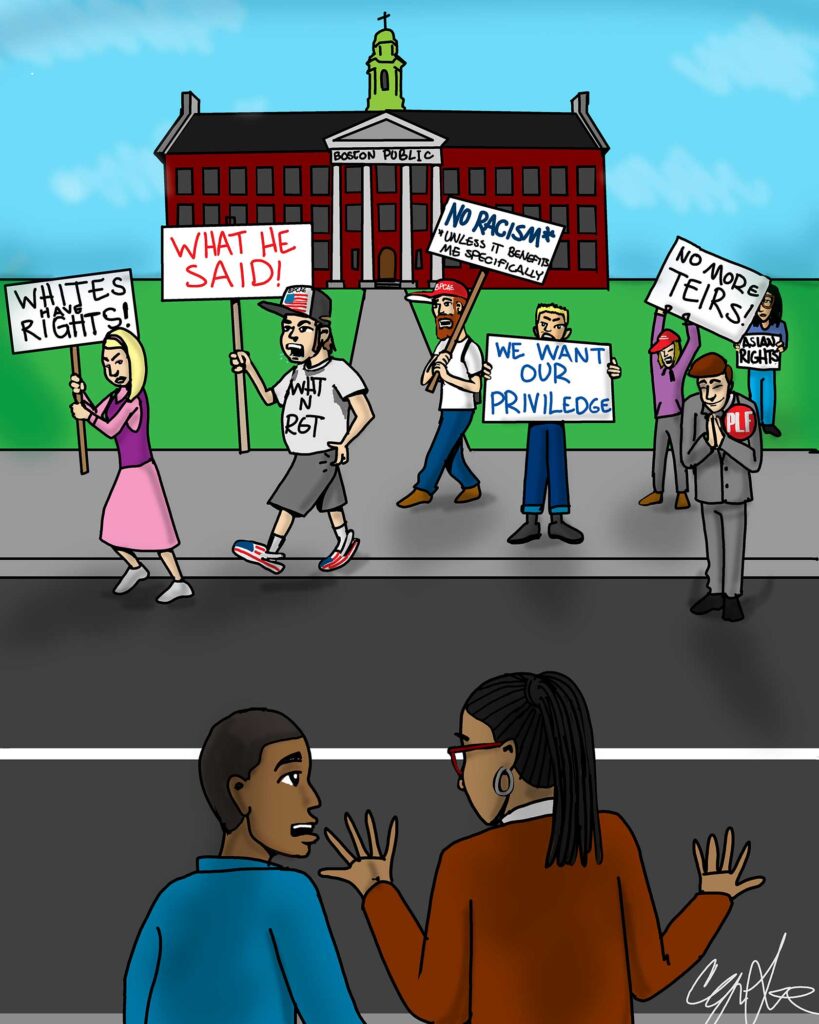It’s time to stop catering to the privileged class — equality means equality

They’re at it again. White and Asian parents have sued in federal court to outlaw the admissions policy for Boston’s exam schools, a policy based on socioeconomic standards that has boosted racial and ethnic diversity at Boston Latin School since its inception. Their lawsuit alleging racial discrimination is the latest expression of white entitlement to the best public school the city has to offer.
Under the current policy, students must have a B average to apply to the city’s three exam schools; the other two are Boston Latin Academy and the John D. O’Bryant School of Math and Science, both in Roxbury.
Applicants receive a score that combines their grades and entrance exam score. Extra points are awarded for living in public housing, being homeless, being in foster care or attending a school whose enrollment is at least 40% low income. Based on such factors, students are split into four socioeconomic tiers, although in previous years there have been as many as eight. Applicants compete with others in their tier for admissions slots, and each tier is awarded a quarter of the slots.
A previous admissions policy, adopted during the pandemic, was based on grades and ZIP Code. That policy was developed by a task force whose members included Tanisha Sullivan, then president of the Boston NAACP. She also was on the task force that formulated the current policy.
The same group of white and Asian parents, called the Boston Parent Coalition for Academic Excellence, sued to overturn the previous admissions policy for discriminating against their children. A U.S. District judge in Boston and the First Circuit Court of Appeals disagreed. Just last year, the Supreme Court passed on hearing that case, with one justice suggesting it was moot because the ZIP Code policy was no longer in use.
The new lawsuit alleges socioeconomic factors are proxies for race that deny the parents’ children their constitutional right to equal protection under the law. That assertion is a stretch. Not all Black and Hispanic children of school age in Boston are low-income, and not all white and Asian children are prosperous.
The legal complaint also argues that Sullivan and other task forces members said they wanted to increase the number of Black and Hispanic students in the exam schools. In the past, Boston Latin, in particular, has been lopsidedly white and Asian in a school system lopsidedly Hispanic and Black. So what’s wrong with making Latin look more like the school system? Even now, it’s nowhere near exactly so, and no racial or ethnic quotas are in play.
In its wrongheaded decision to strike down affirmative action in college admissions, the conservative majority on the Supreme Court said colleges — and presumably K-12 schools — cannot use race as a factor. Those justices did not say socioeconomic factors could not be used.
The lawsuit also claims the current policy has a negative “disparate impact” on white applicants because in most years the percentage of them admitted to exam schools has been lower than their percentage in the overall pool. Lawyers representing these parents think this pattern is a gotcha.
It’s not. The percentage of any group admitted depends on how many apply. The large number of white applicants drives down their admission rate. Since overall there are three times more applicants than slots, not everybody can get in. If the same number from each racial or ethnic group applied, and admissions rates deviated widely, then the parents’ lawyers might have something. But that’s not the case.
The lawsuit is framed as being about the three exam schools. It’s really just about Latin. Nearly all the 17 parents identified by name complain that their child was denied admission to their first or only choice — Latin. Their children didn’t get what they wanted so they’re suing Boston Public Schools and Superintendent Mary Skipper. The parents’ sense of white entitlement is showing.
Two of those parents are identified as Asian. They may be attuned to the way admissions are done in ancestral homelands like China and India, in rank order by test score. As with the plaintiffs in the college admissions case, they may be baffled that anything besides a test and grades matter in school admissions.
The white and Asian parents want to go back to when exam school admissions were based only on grades and an exam. The lawsuit calls the exam used “objective.” That was unproven. For years, the school system used the Independent School Entrance Examination, even though it had never been studied to show it reliably predicted the academic performance of Hispanic and Black students — a specification in the bid the district sent out. Boston stopped using that test not long after GBH News disclosed that breach in the system’s own specifications and the single-source bidding that awarded the contract over and over again to the same test maker.
Here’s hoping that in its response to the lawsuit, the Boston Public Schools fesses up to opening the door to discrimination in the past by using an entrance test that could have been biased. Here’s also hoping the NAACP Legal Defense Fund and a similar public interest law firm representing Hispanic interests file “friend of the court” briefs or, better yet, seek to intervene in this case. Ultimately, judges need to see this lawsuit for what it is — one based on white entitlement and privilege.
Ronald Mitchell
Editor and Publisher, Bay State Banner







Leave a Reply
You must be logged in to post a comment.